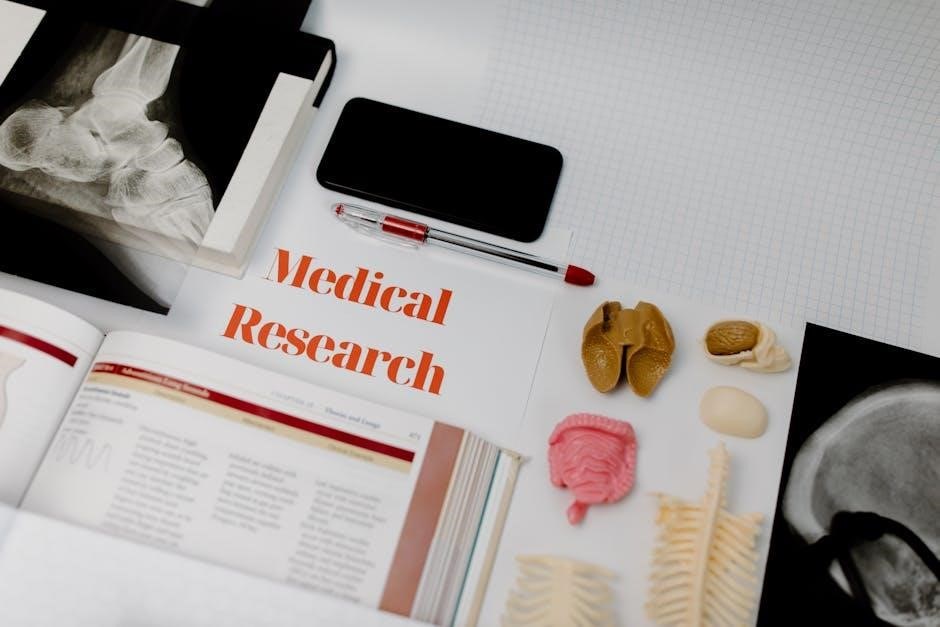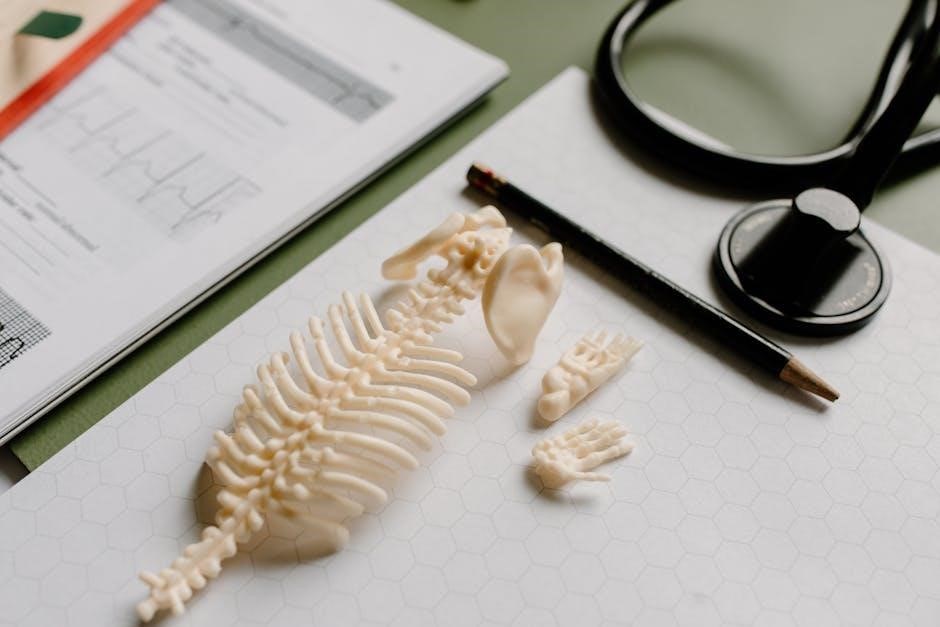Welcome to the Study Guide for Fundamentals of Nursing, a comprehensive resource designed to support nursing students in mastering essential concepts and skills. This guide provides structured learning activities, practice questions, and real-world applications to enhance understanding and confidence in nursing practice.
1.1 What is a Study Guide for Nursing Fundamentals?
A Study Guide for Nursing Fundamentals is a specialized resource designed to help nursing students master the core concepts and skills essential for success in their education and future practice. Typically organized as a companion to textbooks or standalone materials, these guides provide structured learning activities, practice questions, and exercises tailored to reinforce understanding of key topics. Many study guides are available in PDF format, offering convenience and accessibility for students. They often include chapter-by-chapter reviews, case studies, and multiple-choice questions to simulate exam environments. The primary goal of a nursing fundamentals study guide is to simplify complex information, making it easier for students to grasp and retain critical knowledge. These tools are particularly valuable for preparing for exams, such as the NCLEX, and for bridging the gap between theoretical learning and practical application in clinical settings.
1.2 Importance of Using a Study Guide in Nursing Education
Using a study guide in nursing education is essential for fostering academic success and clinical competence. It provides students with a structured and organized approach to learning, helping them master complex concepts and skills. A well-designed study guide bridges the gap between theoretical knowledge and practical application, enabling students to apply what they learn in real-world scenarios. Additionally, it enhances exam preparation by offering practice questions, case studies, and flashcards, which are vital for assessing readiness and identifying areas for improvement. By using a study guide, nursing students can build confidence, develop critical-thinking skills, and stay focused on key topics, ultimately preparing them for the demands of the nursing profession and standardized exams like the NCLEX.
Key Components of a Comprehensive Nursing Fundamentals Study Guide
A comprehensive nursing fundamentals study guide includes structured learning activities, practice questions, real-world case studies, and key term flashcards. These elements ensure a well-rounded understanding of essential nursing concepts.
2.1 Basic Concepts of Nursing Care
The basic concepts of nursing care form the foundation for all nursing practice. These concepts include health, wellness, and illness, patient-centered care, and the nursing process. Health is defined as a state of complete physical, mental, and social well-being, while illness refers to any condition that disrupts this balance. Patient-centered care emphasizes respecting patients’ preferences, values, and needs. The nursing process, a systematic approach to care, involves assessment, diagnosis, planning, implementation, and evaluation. These concepts are essential for understanding the role of nurses in promoting health, preventing disease, and restoring well-being. They also provide a framework for developing critical thinking and clinical decision-making skills, which are vital for effective nursing practice. Mastering these basics ensures a strong foundation for advancing in nursing education and practice.
2.2 Nursing Procedures and Skills
Nursing procedures and skills are the practical applications of nursing knowledge, essential for delivering high-quality patient care. These include clinical skills such as patient assessments, vital sign measurement, and technical procedures like medication administration and wound care. The study guide emphasizes the importance of mastering these skills through hands-on practice and simulation. Proper documentation and communication are also highlighted as critical skills for effective patient care. Understanding infection control measures, safety protocols, and the use of medical equipment is equally vital. These procedures and skills are systematically covered in the study guide, ensuring students gain competence and confidence in performing them. Regular practice and real-world application of these skills are encouraged to prepare students for clinical settings and licensure exams like the NCLEX.
2.3 Historical Perspectives on Nursing
The history of nursing is deeply rooted in compassion, care, and the evolution of healthcare. Florence Nightingale, often considered the founder of modern nursing, revolutionized the field during the Crimean War by emphasizing sanitation, statistics, and patient-centered care. Her work laid the foundation for professional nursing education and practice. Over time, nursing transitioned from religious and domestic care to a structured, evidence-based profession. Historical events, such as World War I and II, further shaped nursing roles, expanding opportunities for nurses in diverse settings. Understanding these historical perspectives provides insight into how nursing has evolved, influencing current practices and ethical standards. The study guide highlights key milestones and pioneers, offering a meaningful context for students to appreciate the profession’s growth and significance in healthcare today.

How to Effectively Use a Study Guide for Nursing Fundamentals
Maximize your learning by utilizing structured activities, practice questions, and active learning strategies. These tools enhance understanding, retention, and application of nursing fundamentals in real-world scenarios effectively.
3.1 Structured Learning Activities
Structured learning activities are essential components of a nursing fundamentals study guide, designed to engage students in active and meaningful learning. These activities often include exercises, quizzes, and interactive tasks that align with textbook content, ensuring a systematic approach to mastering key concepts. By organizing content chapter-by-chapter, students can build a strong foundation in areas like patient-centered care and health concepts. Such activities encourage critical thinking, problem-solving, and the application of theoretical knowledge to real-world scenarios. They also provide opportunities for self-assessment, helping students identify areas for improvement. Regular participation in structured learning activities enhances retention, boosts confidence, and prepares students for clinical practice and licensing exams like the NCLEX. These tools are invaluable for developing the skills and understanding necessary to excel in nursing fundamentals.
3.2 Integrating Knowledge into Practice
Integrating knowledge into practice is a cornerstone of nursing education, and a well-structured study guide plays a vital role in this process. By aligning theoretical concepts with practical applications, students can bridge the gap between classroom learning and real-world patient care. The study guide provides exercises, case studies, and simulations that mirror clinical scenarios, enabling students to apply their understanding of nursing fundamentals effectively. This approach fosters critical thinking and decision-making skills, essential for safe and competent practice. Regularly practicing these exercises helps students transition seamlessly from theory to application, ensuring they are well-prepared for clinical rotations and future professional roles; This integration of knowledge into practice is key to developing confident, capable nurses who can deliver high-quality patient care.
3.3 Active Learning Strategies
Active learning strategies are essential for engaging students and enhancing their understanding of nursing fundamentals. The study guide incorporates various interactive exercises, such as flashcards, NCLEX-style multiple-choice questions, and case studies, to promote hands-on learning. These activities encourage students to think critically and apply theoretical knowledge to real-world scenarios. For instance, flashcards help reinforce key terms and concepts, while case studies allow students to analyze patient situations and develop appropriate care plans. Additionally, interactive exercises, such as simulations or group discussions, foster collaboration and problem-solving skills. By actively participating in these activities, students can identify gaps in their knowledge and strengthen their comprehension of essential nursing principles. This dynamic approach ensures that learning is both effective and engaging, preparing students for the demands of clinical practice.

Important Topics Covered in Nursing Fundamentals Study Guides
Nursing fundamentals study guides cover essential topics like health, wellness, and illness, patient-centered care, and nursing theories, providing a solid foundation for clinical practice and exam preparation.
4.1 Health, Wellness, and Illness
This section explores the core concepts of health, wellness, and illness, essential for understanding patient care. It defines health as a state of physical, mental, and social well-being, while wellness emphasizes preventive measures and healthy lifestyles. Illness is discussed in terms of its impact on patients’ lives and the nurse’s role in promoting recovery. The study guide highlights how these concepts interrelate and influence patient-centered care. By mastering these fundamentals, nursing students can better assess patient needs, develop care plans, and support overall well-being. These topics are critical for building a strong foundation in nursing practice and preparing for clinical challenges. The guide also includes activities to apply these concepts in real-world scenarios, ensuring a deep understanding of health and illness dynamics. This knowledge is vital for delivering compassionate and effective care.
4.2 Patient-Centered Care
Patient-centered care is a fundamental approach in nursing that focuses on tailoring care to meet the unique needs, preferences, and values of each patient. This concept emphasizes respecting patients’ autonomy, involving them in decision-making, and ensuring their comfort and dignity. The study guide highlights the importance of cultural competence and communication skills in delivering patient-centered care. It also explores how nurses can address the physical, emotional, and social needs of patients, ensuring a holistic approach to care. Practical exercises and case studies are included to help students apply these principles in real-world scenarios. By prioritizing patient-centered care, nurses can improve patient satisfaction, outcomes, and overall well-being. This section equips students with the knowledge and skills to provide compassionate, individualized care in diverse healthcare settings. Mastering this approach is essential for effective nursing practice and building strong patient-nurse relationships.
4.3 Nursing Theories and Models
Nursing theories and models provide the foundational frameworks that guide nursing practice, education, and research. These theories explain the nature of nursing, its role in healthcare, and how nurses interact with patients and environments. The study guide explores key theories such as Maslow’s Hierarchy of Needs, Jean Watson’s Caring Theory, and the Nursing Process Model. It emphasizes how these theories apply to real-world situations, helping students understand the “why” behind nursing actions. Practical exercises and case studies are included to reinforce the application of these theories in diverse care settings. By mastering these concepts, students can develop a deeper understanding of evidence-based practice and deliver care that aligns with professional standards and patient needs. This section is crucial for building a strong theoretical foundation in nursing education.

Practice Questions and Exercises
This section provides practice questions and exercises, including multiple-choice and case studies, to help students apply knowledge to real-world scenarios and improve clinical reasoning.
5.1 Multiple-Choice Questions
The multiple-choice questions in this section are designed to assess your understanding of key concepts in nursing fundamentals. These questions cover a wide range of topics, including patient care, health assessments, and nursing procedures. Each question is structured to test critical thinking and application of knowledge. The format mimics professional licensing exams, such as the NCLEX-RN, to help you prepare for real-world testing scenarios. Detailed explanations accompany each question, providing insight into correct and incorrect answers. This feature allows you to identify areas for improvement and reinforce your learning. Regular practice with these questions will enhance your problem-solving skills and build confidence in your ability to apply nursing principles effectively in clinical settings. Use these exercises to track your progress and refine your test-taking strategies for success.
5.2 Case Studies and Scenarios
The case studies and scenarios in this study guide are designed to simulate real-world clinical situations, enabling you to apply theoretical knowledge to practical patient care. These scenarios cover diverse patient populations and common nursing challenges, such as managing chronic illnesses, responding to emergencies, and promoting health education. Each case study encourages critical thinking and problem-solving, mirroring the complexities of actual nursing practice. By analyzing these scenarios, you will gain insights into patient-centered care, cultural competence, and evidence-based interventions. The exercises also help you develop decision-making skills, preparing you for the realities of patient interactions. Regular practice with these case studies will enhance your ability to prioritize care, identify potential complications, and deliver safe, effective nursing interventions. Use these tools to refine your clinical judgment and build confidence in addressing real-world healthcare challenges.
5.3 NCLEX Preparation Tips
Preparing for the NCLEX exam requires a strategic approach, and this study guide offers tailored tips to help you succeed. Begin by understanding the exam format, focusing on priority concepts like patient safety, pharmacology, and care planning. Develop a structured study plan, allocating time for both content review and practice questions. Utilize active learning strategies, such as flashcards and concept maps, to reinforce key information. Prioritize high-weight NCLEX topics, such as medical-surgical nursing and maternal-neonatal care, to maximize your study efficiency. Practice time management by simulating exam conditions with full-length practice tests. Review rationales for correct and incorrect answers to improve critical thinking. Stay calm and focused during the exam, and consider leveraging additional resources like NCLEX-specific test banks and review guides. By following these tips, you can approach the NCLEX with confidence and achieve success.

Additional Resources for Nursing Students
Enhance your learning with flashcards for key terms, online study materials, and test bank questions. These tools provide additional practice and reinforcement of fundamental nursing concepts and skills.
6.1 Flashcards for Key Terms
Flashcards are an essential tool for memorizing key terms and concepts in nursing fundamentals. They provide a concise and portable way to review critical vocabulary, definitions, and processes. Many study guides include flashcard sets that cover topics such as health assessments, patient care procedures, and nursing theories; These flashcards are designed to promote active learning and retention, allowing students to quiz themselves anytime, anywhere. They are particularly useful for reinforcing complex terms and concepts encountered in textbooks or lectures. By using flashcards, nursing students can build a strong foundation of knowledge, which is crucial for success in both academic and clinical settings. Additionally, digital flashcard apps offer interactive features, making studying more engaging and efficient for modern learners.
6.2 Online Study Materials
Online study materials for nursing fundamentals offer a wealth of resources to complement traditional textbooks and study guides. These materials include interactive exercises, video tutorials, and downloadable PDFs that provide in-depth explanations of key concepts. Many online platforms offer structured learning activities, such as multiple-choice questions and case studies, to help students test their knowledge and apply it to real-world scenarios. Additionally, some resources are specifically designed to align with NCLEX preparation, ensuring students are well-prepared for licensure exams. The accessibility of these materials allows students to study at their own pace, reinforcing learning and improving retention. Online study materials are a valuable addition to any nursing student’s toolkit, providing flexible and engaging ways to master the fundamentals of nursing care.
6.3 Test Bank Questions
Test bank questions are an invaluable resource for nursing students preparing for exams and licensure. These questions are carefully curated to cover a wide range of topics in nursing fundamentals, ensuring comprehensive understanding. Often organized by chapter or concept, test banks provide multiple-choice questions that mimic the format of professional exams like the NCLEX. They also include detailed rationales for correct and incorrect answers, helping students identify knowledge gaps and improve critical thinking. Many test banks are available online as downloadable PDFs or interactive modules, offering flexibility for self-paced study. Regular practice with test bank questions enhances problem-solving skills, reinforces key concepts, and builds confidence for exam success. They are an essential tool for any nursing student aiming to master the fundamentals of nursing care.
This Study Guide for Fundamentals of Nursing provides a comprehensive approach to mastering essential nursing concepts. By focusing on key topics, practical exercises, and real-world applications, it equips students with the knowledge and confidence needed for successful nursing practice and exam preparation.
7.1 Final Thoughts on Mastering Nursing Fundamentals
Mastering the fundamentals of nursing is essential for a successful nursing career. This study guide provides a structured approach to learning, integrating theoretical knowledge with practical skills. By focusing on key concepts, such as patient-centered care, nursing theories, and clinical procedures, students can build a strong foundation for their practice. The inclusion of practice questions, case studies, and NCLEX preparation tips ensures readiness for exams and real-world challenges. Additional resources like flashcards and online materials further enhance learning. Consistent practice and review are crucial for retaining information and applying it effectively. This guide is a valuable tool for nursing students, helping them achieve confidence and competence in their professional journey.

The Importance of Fundamentals in Nursing Education
Fundamentals form the foundation of nursing education, providing essential knowledge and skills for safe, effective care. This study guide supports learning by offering structured activities and practical application, reinforcing critical concepts and preparing students for real-world challenges.
8.1 Building a Strong Foundation for Nursing Practice
A strong foundation in nursing fundamentals is crucial for successful nursing practice. This study guide ensures students grasp essential concepts, skills, and theories early in their education, which are vital for patient care. By focusing on key topics like health, wellness, and illness, as well as patient-centered care, the guide equips learners with the tools to deliver safe and effective care. Practical exercises and real-world scenarios help bridge the gap between theory and practice, fostering critical thinking and clinical reasoning. Additionally, resources such as flashcards and test bank questions reinforce learning, ensuring students are well-prepared for exams and future challenges. A solid foundation in nursing fundamentals not only enhances academic success but also builds confidence and competence, enabling students to thrive in their nursing careers.

